Getting real with Suzanne (f**king) Samples author of: FRONTAL MATTER Glue Gone Wild and STARGAZING IN SOLITUDE.
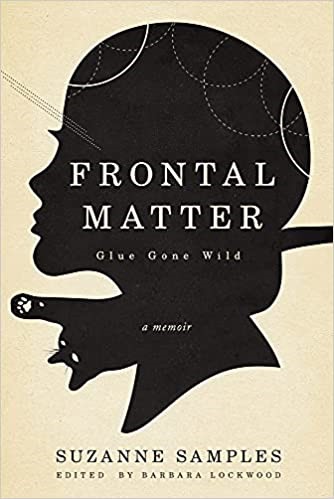
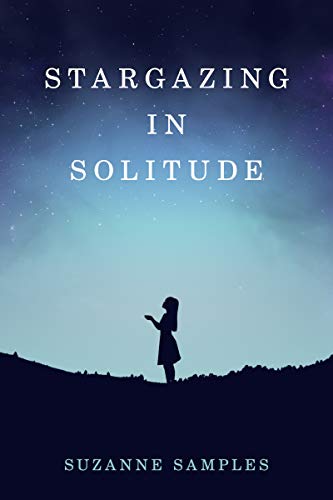
Yes, Suzanne Samples is very pretty but behind her big beautiful eyes and dazzling smile, she is fighting for her life. You see, Suzanne has terminal brain cancer and there ain’t nothin’ pretty about brain cancer.
Sure, there are those of us who (like Suzanne) survive brain tumors/cancer and eventually grow to accept how our lives have changed. We may learn to embrace the benefits of mindfulness and positivity. With time, some of us even begin to experience gratitude for the gifts that come from near-death experiences like having our skulls cracked open and getting brain tumors resected from our heads. But, brain cancer itself is a beast. It’s devastating. It’s mean. And, it’s ugly!
Since so much of what brain tumor/cancer patients go through during recovery (and beyond) is invisible and funding for a cure is so limited, it’s important that brave people champion the reality of the disease…and Suzanne does just that! Suzanne gets very real about the gruesome details of brain cancer and its aftermath in her newest memoir, STARGAZING IN SOLITUDE. Expressing herself through an abundance of f**k’s and other expletives, there is just something so raw and real about her writing and her ability to speak her truth.
Perhaps you recall my first interview with Suzanne about her book, FRONTAL MATTER Glue Gone Wild. In that interview, I was starstruck by the fact that Suzanne played five consecutive seasons of roller derby! She conveyed the devastating loss that accompanied her brain cancer diagnosis with musings like, “A month earlier I was flying around a rink on roller skates smacking into people with my hips, and then I can’t even walk. Within a day everything was gone.”
In STARGAZING, Suzanne addresses a variety of the realities that people dealing with brain cancer face. She continues to confront her own mortality in a brutally honest way; while also sharing about issues that range from the importance of human connections to the severe emotional pain derived from the loss of friendships. She talks about her struggles, loneliness, anger, the cost of cancer, and what it’s like to be a young woman living with disabilities (many of which are invisible).
Suzanne has a unique writing style. She has found her voice and she captivates the reader with language that has both poetic symbolism and details so vivid you feel like you are watching the story unfold in real-time. At one point, she described a terrible fall while she was home alone. She was near the front door and couldn’t get up. She knew at any moment her friend would come bursting through that door and the way she described her fear of being crushed made me feel like I was reading a psychological thriller. I simply couldn’t put the book down until I knew how the scene concluded.
“There’s no fixing a brain that has a mind of its own.”
– Suzanne Samples, Ph.D
Wendy: Welcome back, Suzanne. Congratulations on continuing to beat the odds of your original prognosis. A lot has happened since our last interview, and even since STARGAZING IN SOLITUDE was published. Can you please bring us up to date on what’s new and how you’re doing now?
Suzanne: Hello again and thanks for the second interview! You’re right, since we last talked, a lot has happened. I lived with my parents for a minute in West Virginia, but I ended up moving to Washington state in June with my pets and boyfriend when his job transferred him.
Unfortunately, not long after we moved out here, an MRI showed several new tumors, so I am back in treatment. The tumors were caught early this time, so I’m just doing chemo for now. My original tumor was also retested when I transferred care to UW Seattle, and they discovered I don’t have Glioblastoma but a tumor called a high-grade Astrocytoma with piloid features. It mimics Glioblastoma, but it seems no one knows much about it!
Wendy: Oh my gosh that is a lot, Suzanne! I’m so glad the new tumors were discovered early and that you’re able to receive treatment again (even if it’s “JUST” chemo).
In FRONTAL MATTER Glue Gone Wild you spoke about your craniotomy, radiation, a trial drug, and chemotherapy. In STARGAZING IN SOLITUDE, you added the Optune device to the treatment mix. What can you tell us about your experience with Optune?
Suzanne: Optune was an absolute trip. I thought it would be so easy, and I was actually looking forward to wearing it. I didn’t mind the sci-fi appearance because I knew it would be good for treating my original tumor. Plus, all the people on the brochure were smiling and so happy!
In reality, Optune was difficult for me to place on my head, so I never really knew if I arranged the panels effectively. It’s a lot easier if you live with someone else who can provide a little help, but I didn’t at the time. I always ended up scorching my head with the panels, or they would fall off. I always looked like I had been unattended and somehow escaped out of an experimental lab.
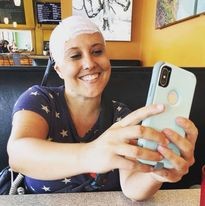
I eventually gave up on Optune when I walked into the doctor’s office, and they gave me some very exasperated looks. I will say, though, if you have some help, I’ve heard it can be really effective for treating high-grade gliomas.
Wendy: Can you share how you went about managing your type one diabetes while you were doing Optune?
Suzanne: It was the same as always–as you know, you just never know what diabetes is going to do. You can follow the same insulin plan and eat the same foods and get good results for nine days, but then on the tenth day, everything goes haywire for no reason. Sometimes I find diabetes way less cooperative than cancer because of it’s minute-to-minute management. Optune kind of felt like just another thing to keep track of, which made life difficult. I recently found a really good diabetes endocrinologist in Idaho (we live on the Idaho/WA border) who is positive and encouraging, which has made a big difference for me.
Wendy: What a relief that must be!
You elaborated on the emotional impact of brain cancer this time around. I found the following statements to be particularly poignant:
- “Sure, I smile all the time, but the cancer has spread from my brain to my emotions. I feel negative. Hopeless.”
- “December: the close of another year. A year I did not think I would live to see. A year full of seizures, pills, gadolinium contrast, and the type of specified anxiety correlated with receiving a terminal diagnosis.”
- “I get home from Brooklyn and start my next round of chemo. Choking down those pills and waiting for the vomiting and nausea to stop is the loneliest thing I have ever experienced.”
What, if anything, did experiencing such strong emotions teach you about yourself and others?
Suzanne: I’ve always been an emotional person, but I started to feel the depth and horror of extreme hardship, loss, and grief after my diagnosis. There became an obvious split in the people I knew and met: People Who Had Been Through Shit & The Lucky Ones. Everyone goes through hard times, but some people experience very traumatic, unimaginable events that go past breakups and minor sad occurrences. If you’re intuitive, you can almost tell just by looking at someone if they fall into the first category. I never begrudge The Lucky Ones, but they have a freedom they often don’t recognize until it’s gone.
“I’ve always been an emotional person, but I started to feel the depth and horror of extreme hardship, loss, and grief after my diagnosis.”
Wendy: As a fellow survivor, I can very much relate to the questions that run through your mind at various points in the brain cancer journey. You wrote, “I have no map for what to do next in my life. I navigated surgery, rehabilitation, chemo, and radiation more easily than most people, yet I have no idea how or why.”
The first couple of years after my craniotomy I was afraid to make plans and was just surviving from MRI to MRI. It took a long time for me to move past that.
What advice would you give to other survivors coping with similar questions?
Suzanne: STARGAZING was more about depression than brain cancer or diabetes. I may not have outright written that, but it very much was. After you get surgery, chemo, and radiation, everyone kind of forgets about the experience except for you. You feel kind of frozen. Except for those MRIs, the world kind of stops, and at some points, you feel like you’re just waiting for a recurrence. I remember my doctor telling me, “The hardest part is after you finish treatment because you have no idea what to do next.” He was very much right!
My best advice is to just keep moving. I didn’t follow my own advice for a long time, so do better than I did. Keep moving! If you can’t physically move, find something you enjoy, whether it’s video games or crafts or helping others. However, don’t compare yourself. Just because so-and-so is able to do something wonderful doesn’t mean you are failing. Many of my brain cancer friends do amazing works of advocacy and really put themselves out there; I admire them, but it doesn’t mean I can’t do my own thing. Everyone has their own talents to share.
I quit writing for a long time, and I hate that I did. I regret that. Eventually, my publisher said, “Why aren’t you writing?,” and I finally picked up the pieces and got back to it. I’m very grateful for her.
“After you get surgery, chemo, and radiation, everyone kind of forgets about the experience except for you.”
Wendy: Throughout STARGAZING you shared how important being published and seeing your book in a bookstore was to you. You wrote about the irony of finally finding a publisher after writing a memoir about your experience with brain cancer. You said, “I had to start dying to make my dream come true, to achieve my biggest goal in life.” You later continued, “If only I could unlock the universe. This is what I have always wanted, the ability to publish a meaningful book, in a style all my own. To share my writing with others who would have faith in my words. To pick up that book and say I did this.”
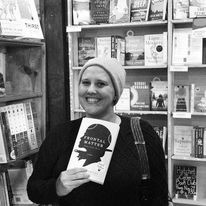
Since you never set out to write a memoir and you considered yourself more of a short and flash fiction writer, I have to ask… what if you had to choose one, your life before the brain cancer diagnosis or having your memoirs published?
Suzanne: I would definitely choose my life before brain cancer! However, I can’t change having cancer, so I’m trying to make the best of what happened and what’s to come. I don’t think any of us want brain tumors, but most of us navigate this new and challenging world the best we can–brain cancer often gives us the push to do what we always wanted to try but avoided because of fear or lack of time. After being diagnosed, some of us write, some of us learn to tap dance, some of us start support groups, and some of us make others laugh on social media. I was always a writer, but brain cancer forced me to write better.
“I don’t think any of us want brain tumors, but most of us navigate this new and challenging world the best we can–brain cancer often gives us the push to do what we always wanted to try but avoided because of fear or lack of time.”
Wendy: You also wrote, “Without the label of fiction, I have nothing to hide behind. My endocrinologist has read FRONTAL MATTER and knows how terrible I am at taking care of my diabetes. My boss has read FRONTAL MATTER and knows I relied on a marijuana tincture to get me through nine months of chemotherapy.”
What has been the biggest challenge with people wanting to get to know you and how do you feel about your students reading your books?
Suzanne: It makes me feel very naked! I’m pretty reserved in person until people get to know me, so putting everything out there on paper feels intimidating. At a certain point, though, you have to let it go and trust the process. I think people can sense when writers hold back, and that’s not the type of writer I want to be. I also curse a lot in my writing and not in person. My writing is definitely my internal monologue that does not get filtered.
I don’t mind at all if my students read the books. They are in college, so they can handle mature subjects. However, most of them are so busy during the semester that they don’t have time to read anything else until their holiday or summer break.
Wendy: You brought up something that I believe often gets overlooked or glossed over before brain surgery. You wrote, “Since brain surgery, I have had difficulties hearing more than one sound at the same time. I immediately go into sensory overload and feel the world around me start to spin.”
I went through the same thing and it wasn’t until about six months ago (over six years after my craniotomy) that it started getting better. You also wrote, “My first surgery was so shocking and traumatic, I knew I never wanted another craniotomy.” I remember making a similar statement during my first year of recovery.
How do you think medical professionals can better prepare patients for the impact of brain surgery?
Suzanne: I still have that problem! I was lucky to have a fantastic team of various therapists in the hospital who did their best to prepare me for life after surgery, but there was a gap when I got home and didn’t have a team of people there with me when I was lost. I wish I would have taken advantage of at-home care or simply had a professional stop by daily to make sure I was thriving at home (I lived alone at the time). I was prideful, though, and thought if I asked for help, no one would ever trust me at home alone. However, I was so often overwhelmed by the simplest tasks, and I felt embarrassed asking friends to help. Also, I’ve changed my mind about another craniotomy if I need it. Bring it on!
Wendy: That’s kind of funny–don’t tell anyone–but I think I’ve finally changed my mind about another craniotomy (if necessary) too.
You’re obviously an animal lover. You wrote about all of the animals in your life but sadly you had to deal with the loss of your beloved cat, Prufrock. You wrote, “Pru saw people come and go from my life: boyfriends, other pets, friends, and a husband. She is the only creature I can trust. I need to die before her.” I’m sorry for your loss, Suzanne. I’ve literally had the same thought about my dog, Marley.
Fortunately, a new kitten which you named Delilah came into your life. How is Delilah doing and what is her personality like?
Suzanne: I miss Pru terribly, but she was struggling with her own health issues, and I realized I was keeping her alive for me. I needed to let her go. And then along came Delilah! Delilah is very much an individual; she is something else. She was found living under a house with 30 other cats. (All were rescued and safely rehomed or placed on a farm for feral kitties, and that’s not a euphemism.) As a tiny kitten, Delilah strutted into my apartment, meowed, “Hey, what did I miss?” and made herself right at home. My boyfriend calls her The Foreman because she has to supervise every project and approve of everything; if the project happens outside, you can bet she will supervise from the window and meow if she doesn’t approve. Nothing gets by her. She’s also very vain and beautiful, but if you’re a cat, that’s acceptable. She will spend hours a day looking at herself in the mirror and meowing. I can’t blame her, though—she is quite gorgeous!

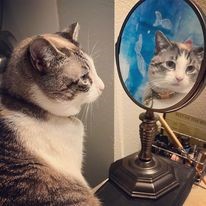
Wendy: In STARGAZING IN SOLITUDE you shared about the trouble you had coming up with the title of your first book, FRONTAL MATTER Glue Gone Wild. Did you have a similar experience this time around?
I loved the brilliant way you compared the brain and brain cells to the universe and stars. Which came first, the metaphors or the title?
Suzanne: This time, the title came very quickly. Before I wrote the book, one of my favorite things to do was stand outside of my Boone, North Carolina, apartment and gaze at the stars. They were always gorgeous, but it was a lonely time in my life. I came up with the title first and then realized what an apt metaphor it was since Astrocytomas, the cells that comprised my type of tumor, are star-shaped. Sometimes, writing is easy like that, and everything just makes sense. For me, writing and life often have an inverse relationship; when my life is going well, I struggle with writing, but when writing comes easily, I’m often struggling with life. It’s a tradeoff!
Wendy: Interesting! Will there be a third book? Is this part of a memoir trilogy?
Suzanne: Yes! I’m working on it now, and it’s called Thirteen Tunnels. It’s still in the late drafting process, but it’s coming along!
Wendy: Oh that is so exciting, I can’t wait to read it and hopefully have you back for a third interview!
Thank you so much for your time today, Suzanne. Is there anything else you would like to add?
Suzanne: If you have a brain tumor, you’re going to have rough times. It’s not if they happen but when. It’s vital to channel that energy somewhere and not give up! It’s okay to have bad days and feel those bad days. You’re going through something astronomically hard that not everyone will understand. Embrace the hard times…and adopt or foster a shelter pet to help you out and give them a safe home!
Wendy: You’re amazing! Wishing you the very best now and always.
Suzanne can be found on Facebook @Suzanne Samples, Instagram @never_sold_a_thigh_master (people confuse her name with Suzanne Somers a lot), or Twitter @suzanne_samples.
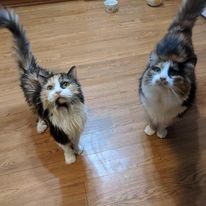
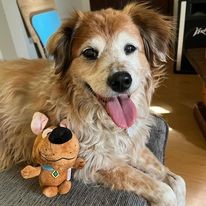

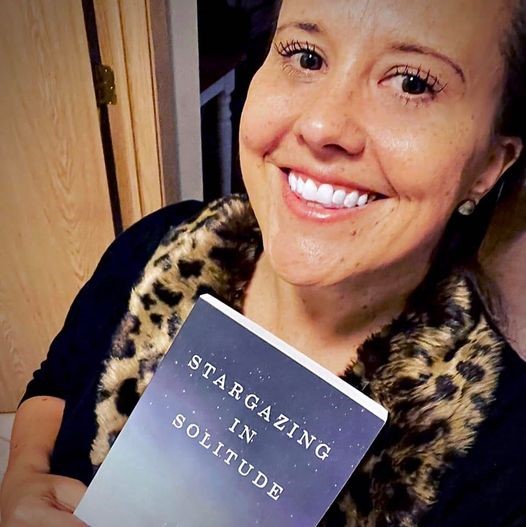
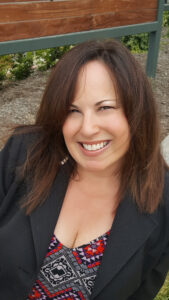 Hello. My name is Wendy and I’m a recovering workaholic. I'm also a brain tumor/cancer survivor.
The purpose of this blog is to share my experiences, memories, resources, and self-discoveries as I continue to transform from a workaholic into a more balanced person. I have read several books and stories about others who have had similar experiences
Hello. My name is Wendy and I’m a recovering workaholic. I'm also a brain tumor/cancer survivor.
The purpose of this blog is to share my experiences, memories, resources, and self-discoveries as I continue to transform from a workaholic into a more balanced person. I have read several books and stories about others who have had similar experiences 